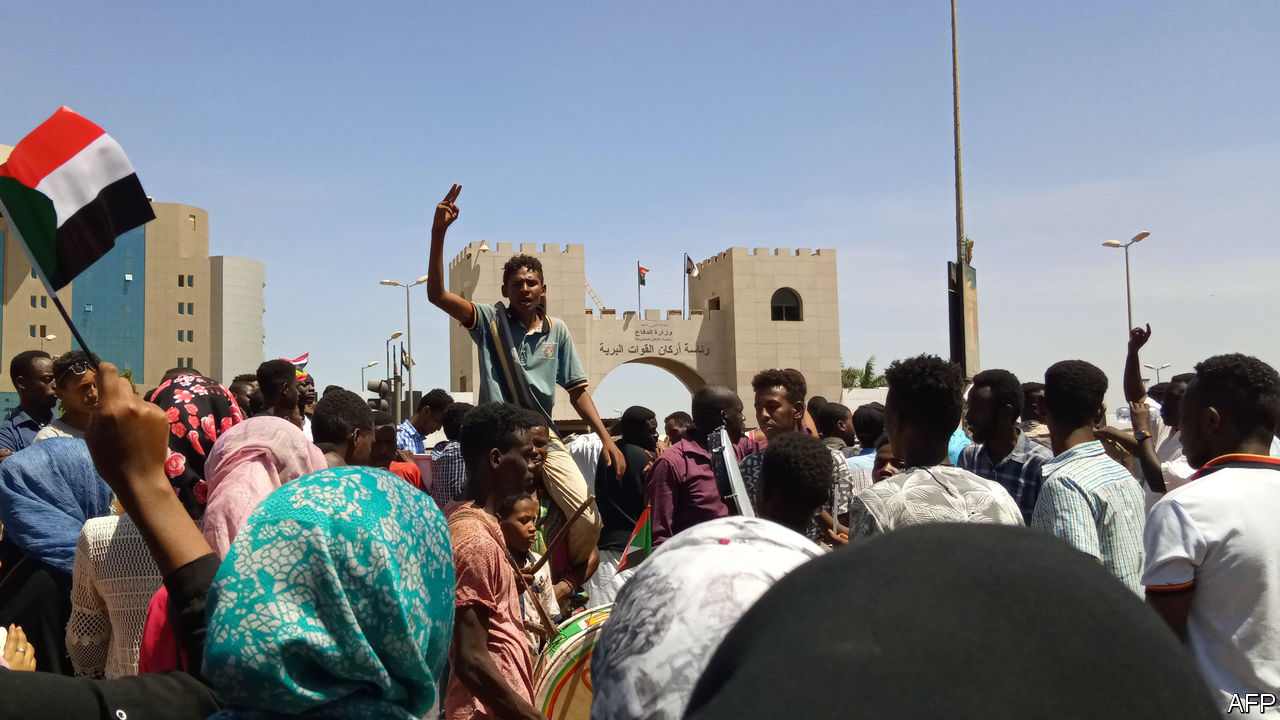The generals have blinked and replaced one of their own

Apr 15th 2019
AWAD IBN AUF was leader of Sudan for just over a day. In his brief spell as head of state the former vice-president and defence chief declared a three-month state of emergency, suspended the constitution, arrested a few senior officials and announced a curfew. “The people asked us to take over…and we did,” he said in a stony-faced televised address on April 11th, shortly after placing his boss, Omar al-Bashir, under house arrest. It looked as if four months of nationwide protests against Mr Bashir and his 30-year-old autocracy had culminated in a coup.
Sudan’s demonstrators, who have been camped outside the headquarters of the armed forces in central Khartoum since April 6th, were having none of it. Though they had called on the army to side with them in order to topple Mr Bashir, who has ruled since 1989, his bloodstained deputy was far from the replacement they had in mind. Mr Auf has had sanctions placed on him by America for his role in war crimes (his former boss has been indicted by the International Criminal Court for genocide in Sudan’s Darfur region). Faced with a storm of popular outrage, the short-lived autocrat stepped down on April 12th. He was replaced by another general, Abdel-Fattah Burhan, then head of the army. Mr Burhan is said to be more popular with rank-and-file soldiers, many of whom are sympathetic to the demonstrators.
Mr Burhan has so far made a better fist of the job. His speech on April 13th was less tone-deaf than that of his predecessor. He commended the revolution, particularly noting the prominent role played by women in the protests that began in December in response to rising food prices. He paid tribute to the civilians who have been killed by security forces in the past four months. More concretely, he promised to hand over power to civilians after a transition period of no more than two years.
On April 13th the opposition nominated delegates to begin negotiating with a military council headed by Mr Burhan. In the first meeting the council promised to repeal all repressive laws and to oversee a predominantly civilian administration, according to the Sudanese Professionals’ Association (SPA), which organised many of the protests. Alongside this, the military council moved to weaken the power of the former tyrant. It replaced Salah Abdallah Gosh, the intelligence chief widely regarded as the second most powerful man in the country after Mr Bashir. On April 14th the military council said it had arrested members of Mr Bashir’s National Congress Party (NCP) and would begin seizing the party’s assets. It also promised to restructure Mr Gosh’s notorious intelligence agency and to allow the opposition to choose a new prime minister.
But the protesters remain dissatisfied. “We can’t live on promises,” says Hamid Murtada, an activist. The SPA has called for the sit-in outside the defence ministry to continue until the “deep state” is fully dismantled. Many people are particularly worried by the appointment of Mohamed Hamdan Dagalo (known as Hemeti) as the military council’s deputy leader. A paramilitary unit he was in charge of, the Rapid Support Forces, with links to the notorious Janjaweed militia, was involved in the mass rape and butchery of civilians while battling rebels in Darfur. He and others in the junta’s top ranks are close to Saudi Arabia and the United Arab Emirates, both of which welcomed developments over the weekend. Saudi Arabia has promised aid to help ease the country’s economic woes.
Whether the junta will actually relinquish power remains to be seen. “It’s very possible the military said all that just to end the sit-in,” says Mohammed Osman, an analyst in Khartoum. Indeed, on the morning of April 15th it tried again to disband the protest, this time asking demonstrators to help clear roadblocks. After a brief stand-off the soldiers retreated. “Clean up the regime and we’ll clean up the square,” shouted protesters as they departed. The generals had better put their aprons on.